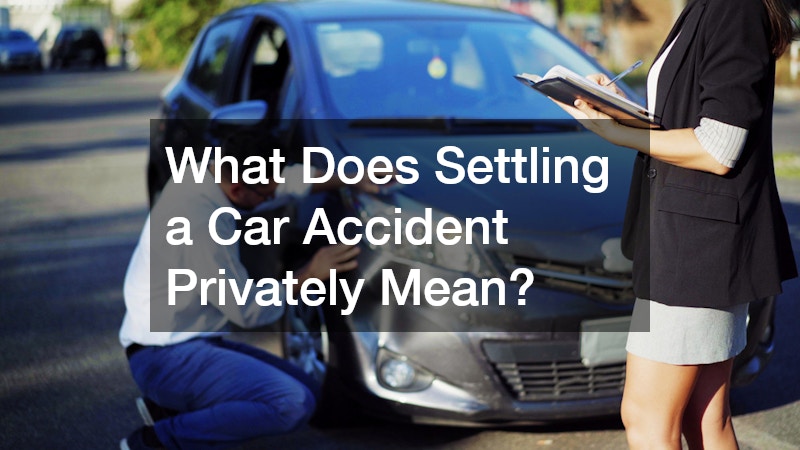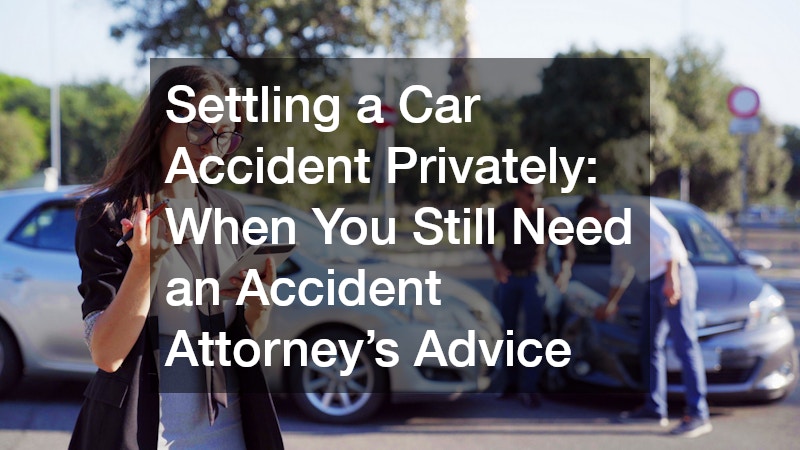

Settling a Car Accident Privately: When You Still Need an Accident Attorney’s Advice
What Does Settling a Car Accident Privately Mean?
Understanding the Basics
Settling a car accident privately means that the drivers involved in the incident come to an agreement without reporting the accident to their insurance companies or law enforcement (if not legally required). This typically includes determining fault, agreeing on a compensation amount, and completing payment—all handled directly between the parties.
Potential Advantages
Private settlements can spare both parties the hassle of claim investigations, premium hikes, and prolonged repair processes. It offers more control over how and when damages are repaired and may allow for quicker fixes from trusted local auto repair shops or auto garages.
Common Misconceptions
Many drivers believe private settlements are always simpler or risk-free. In reality, these arrangements can backfire if not documented correctly or if the other party changes their story later. Some also assume that if no visible damage is present—like cracked brakes or misaligned wheels—no legal steps are needed. This is a dangerous misconception, as even minor issues can worsen over time.
Why Consider Settling a Car Accident Privately?
Avoiding Increased Insurance Premiums
One of the most common reasons drivers choose private settlements is to avoid future premium hikes. Even small claims can lead to significant increases, particularly for younger or high-risk drivers.
Maintaining Privacy
Private settlements offer discretion. There’s no insurance company logging the incident or adding it to your record, which is ideal for those who prefer to keep personal matters out of corporate databases.
Speeding Up the Resolution Process
Insurance claims can take weeks or months. In contrast, private settlements can lead to same-day resolutions, especially if both drivers agree on fault and damage costs. You might even get immediate repairs done at a local auto glass repair service or car repair shop.
When is it Appropriate to Settle Without Involving Insurance?
Minor Accidents and Small Damages
If both vehicles sustained minimal damage—such as a scratched bumper or cracked taillight—it may not make sense to file a claim. In these cases, fixing the damage out-of-pocket at a local auto garage can cost less than your deductible.
Clear Liability Scenarios
When it’s obvious who’s at fault (for example, someone rear-ends your stopped vehicle at a red light), the risk of dispute is lower, making private resolution more feasible.
When Both Parties Agree
Mutual consent is key. If both drivers are open to settling without escalating to insurance or involving a workers comp attorney, a private settlement becomes a more viable path.
What are the Risks of Settling Without Legal Guidance?
Potential for Unfair Settlements
One major risk is accepting too little compensation. Without a lawyer’s input, you may underestimate the cost of car repairs or the long-term impact of a minor injury. This is especially risky when auto mechanics later uncover hidden damage that wasn’t visible immediately after the crash.
Legal Repercussions
If the agreement isn’t properly documented, the other party may deny it occurred or even file a claim later. This can put you in legal jeopardy, especially in states with strict liability rules.
Future Liability Issues
What happens if the other driver later claims to have sustained whiplash or a back injury? Without formal documentation and legal advice, you might end up liable for more than you bargained for. An attorney can help structure a release of liability to prevent future claims.
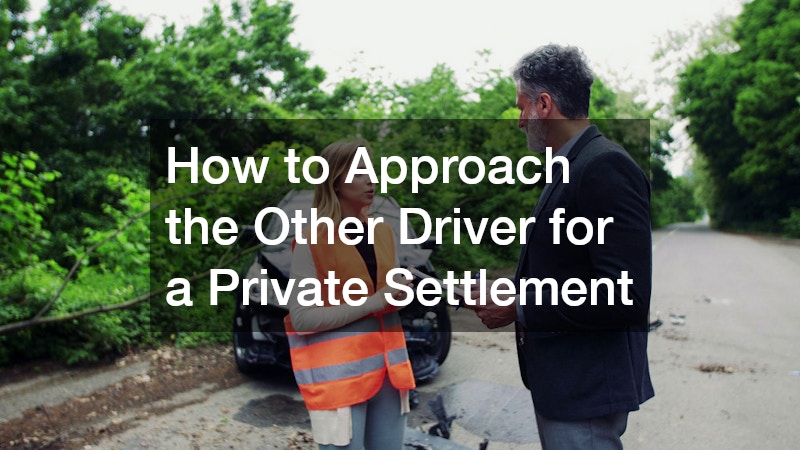 How to Approach the Other Driver for a Private Settlement
How to Approach the Other Driver for a Private Settlement
Initiating the Conversation
Start calmly and respectfully. Ask the other driver if they’re open to settling the matter privately before involving insurance. Be sure not to admit fault outright; instead, focus on resolving the situation cooperatively.
Offering a Reasonable Proposal
Obtain estimates from trusted car repair shops or auto mechanics before offering a compensation amount. Refer to repair receipts or get input from a reputable auto glass repair service to make your offer more credible.
Documenting the Agreement
Use clear language to outline what both parties agree to. A written agreement should include the date, location, names, a brief description of the accident, the agreed-upon compensation, and a clause releasing both parties from further claims.
What Documentation is Necessary for a Private Settlement?
Writing an Agreement
The written agreement is your most powerful legal shield. It should state that the matter is considered fully resolved upon payment and that neither party will pursue future legal or insurance claims. Including both parties’ signatures and driver’s license numbers adds credibility.
Collecting Relevant Evidence
Take detailed photos of the vehicles, the damage, and the scene. Keep copies of repair estimates, witness statements, and any correspondence between you and the other driver. These can help protect you if things go awry later.
Proof of Payment
Always use traceable payment methods like checks or bank transfers. Avoid paying in cash, as it leaves no paper trail. Attach a receipt to your agreement as proof that the payment was made and accepted.
How Can an Attorney Assist Even in a Private Settlement?
Reviewing Settlement Agreements
Even if you’re not going to court, an accident attorney can review your written agreement to ensure it protects your rights. This is particularly helpful in states with complex liability laws.
Advising on Legal Rights
If you’re unsure what compensation you’re entitled to—or whether you should be paying anything at all—an attorney can provide clarity. For example, they may advise that you’re not legally liable based on traffic laws or comparative negligence.
Assessing Fair Compensation
Attorneys often work closely with auto repair experts and medical professionals. They can provide a more accurate estimate of fair compensation—beyond what you might assume based on a surface-level look at the damage.
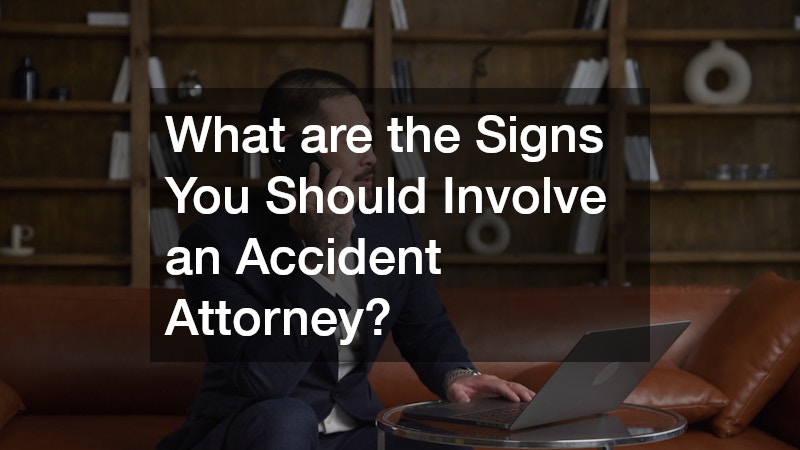 What are the Signs You Should Involve an Accident Attorney?
What are the Signs You Should Involve an Accident Attorney?
Discrepancies in Account
If the other driver starts changing their story or blaming you unfairly, it’s time to call a lawyer. Inconsistent narratives can turn a simple settlement into a legal mess.
Injuries Emerging Post-Accident
Sometimes, physical symptoms like neck pain or back strain don’t appear until days later. If you or the other party claims injury after the fact, settling without legal advice could leave you vulnerable to unexpected medical bills or liability.
Complex Insurance Policies
If either driver has a complicated insurance setup (such as multiple drivers on one policy or overlapping coverage), an attorney can help clarify who’s responsible and ensure you’re not inadvertently violating a clause.
How Do State Laws Affect Private Settlements?
Understanding Contributory and Comparative Negligence
In some states, if you’re even 1% at fault, you may not be able to recover damages (contributory negligence). Others allow for partial recovery based on the percentage of fault (comparative negligence). Knowing where your state stands is critical before making a private deal.
Minimum Liability Requirements
Even if both drivers agree to a settlement, some states require you to report any accident involving injury or damages over a certain threshold. Failing to do so—even in a private deal—can lead to fines or license penalties.
State-Specific Regulations
Some states have forms or processes that must be followed even for private settlements. An attorney can help you ensure you’re compliant with these lesser-known rules to avoid legal trouble down the road.
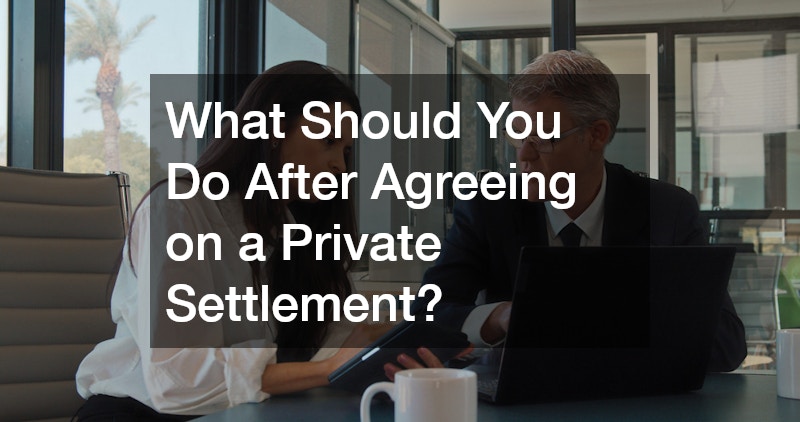 What Should You Do After Agreeing on a Private Settlement?
What Should You Do After Agreeing on a Private Settlement?
Finalize the Agreement
Have both parties sign the agreement, and consider having it notarized if possible. Each person should keep a copy for their records. This final step solidifies the deal and offers legal protection.
Ensure Payment is Made
Prompt payment helps maintain trust and avoids future disputes. Use secure payment methods, and send a follow-up message or email confirming receipt and satisfaction.
Follow Up on Any Additional Conditions
If the agreement includes terms like “repairs must be completed at XYZ auto garage” or “party A will pay upon delivery of estimate,” make sure those conditions are fulfilled. Keep copies of all related invoices or car repair shop records.
Conclusion
Settling a car accident privately can be a cost-effective and efficient way to resolve a minor incident—especially when both parties are cooperative and the damage appears minimal. Bypassing insurance claims can help avoid rising premiums, reduce wait times for repairs, and allow both drivers to maintain privacy. In scenarios where there’s no injury and the fault is clear, handling things one-on-one can seem like the simplest route.
However, even the most straightforward fender bender has the potential to spiral into a complicated legal or financial issue if the proper steps aren’t taken. What seems like a superficial scratch on the bumper could hide deeper structural problems. A cracked windshield might lead to safety issues down the road. Misaligned brakes, if ignored, can affect vehicle performance and passenger safety. Without a thorough inspection by qualified auto mechanics or a reliable car repair shop, you may underestimate the true extent of the damage—or overpay for someone else’s repairs.
That’s why, even in informal arrangements, it’s wise to consider the value of having an accident attorney or lawyer review the terms of your settlement, assess liability, or simply confirm that your rights are protected. A professional can help you draft or revise your agreement, ensure you’re not unknowingly admitting fault, and provide guidance on whether your state’s laws allow for such a settlement in the first place.
The advice of an experienced attorney—even in seemingly low-stakes situations—can safeguard your financial future and prevent long-term consequences. It’s not just about protecting yourself from dishonesty or disputes; it’s also about ensuring that your agreement is legally enforceable, your documentation is complete, and you’re not exposed to future claims or medical bills.
So before you rely on a handshake and a Venmo transfer to resolve what seems like a simple fender bender, take a moment to pause and ask yourself: is this something I should run by a legal professional first? Even if everything appears straightforward—minor damage, cooperative drivers, and no visible injuries—there could be hidden complications just beneath the surface.
That one conversation could save you thousands in unexpected repair bills, legal fees, medical expenses, or insurance penalties. More importantly, it offers the peace of mind that comes from knowing you’ve covered your bases. In matters of liability and personal responsibility, peace of mind is priceless—and it costs far less than the potential consequences of going it alone.


